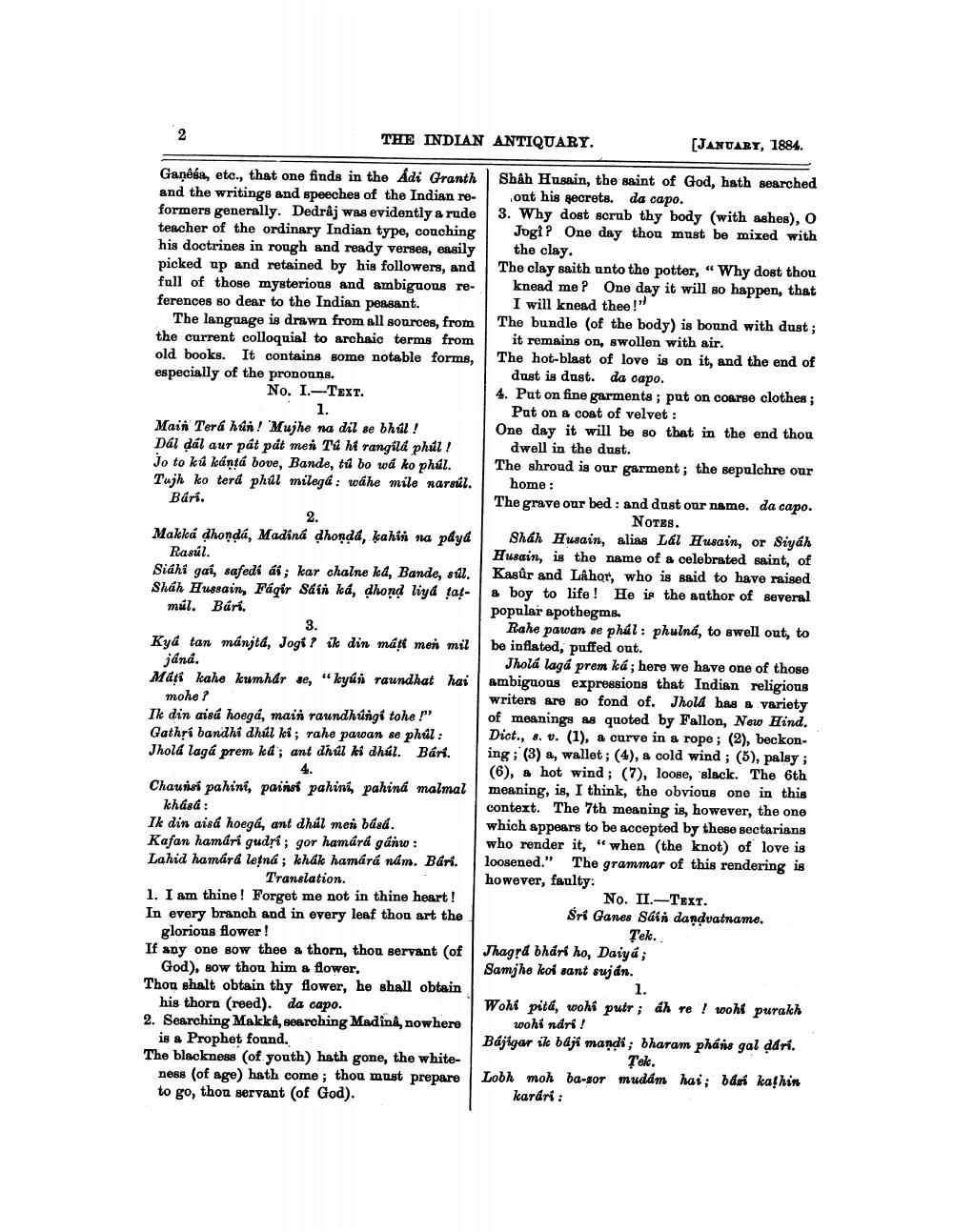Book Title: Indian Antiquary Vol 13 Author(s): John Faithfull Fleet, Richard Carnac Temple Publisher: Swati Publications View full book textPage 8
________________ THE INDIAN ANTIQUARY, (JANUARY, 1884. 2. Ganêsa, etc., that one finds in the Adi Granth Shah Husain, the saint of God, hath searched and the writings and speeches of the Indian re- out his secrets. da capo. formers generally. Dedrâj was evidently a rude 3. Why dost scrub thy body (with ashes), O teacher of the ordinary Indian type, couching Jogi? One day thou must be mixed with his doctrines in rough and ready verses, easily the clay. picked up and retained by his followers, and The clay saith unto the potter, “Why dost thou full of those mysterious and ambiguous re- knead me? One day it will so happen, that ferences so dear to the Indian peasant. I will knead thee!! The language is drawn from all sources, from The bundle (of the body) is bound with dust; the current colloquial to archaic terms from it remains on, swollen with air. old books. It contains some notable forms, The hot-blast of love is on it, and the end of especially of the pronouns. dust is dust. da capo. No. I.-Text. 4. Put on fine garments ; put on coarse clothes ; 1. Pat on a coat of velvet: Main Terá húi ! 'Mujhe na dil se bhul ! One day it will be so that in the end thou Dál dál aur pát pát meii Tihi rangilà phil! dwell in the dust. Jo to kú kántá bove, Bande, tú bo wa ko phúl. The shroud is our garment; the sepulchre our Tujh ko terá phůl milegá: wahe mile narsúl. home : Bari. The grave our bed : and dust our name. da capo. Notes. Makká dhondá, Madina dhonda, kahit na pdya 1 Shah Husain, alias Lal Husain, or Siyah Rasul. Husain, is the name of a celebrated saint, of Sidhi gai, safedi ái; kar chalne ka, Bando, sul. Kasûr and LÅhor, who is said to have raised Shah Hussain, Fágir Sdíi ká, dhond liya tal- a boy to life! He is the author of several mul. Bári. popular apothegms. 3. Rahe pawan se phil: phuiná, to swell out, to Kyá tan mánjtá, Jogi ? sk din mátt men mil be inflated, puffed out. jáná. Jholá lagá prem ká; here we have one of those Mari kahe kumhar se, “kyúi raundhat hai ambiguous expressions that Indian religious mohe? writers are so fond of. Jhold has a variety Ik din aisá hoegá, main raundhangi tohe!" of meanings as quoted by Fallon, New Hind. Gathri bandhi dhil ki; rahe pawan se phúl : Dict., 8. v. (1), a curve in a rope ; (2), beckonJhold laga prem kd; ant dhul ki dhul. Bári. ing ; (3) a, wallet; (4), a cold wind ; (5), palsy ; (6), s hot wind; (7), loose, 'slack. The 6th Chaunisí pahini, painsi pahini, pahina malmal meaning, is, I think, the obvious one in this khásá: context. The 7th meaning is, however, the one Ik din aisá hoegá, ant dhúl mer básd. which appears to be accepted by these sectarians Kafan hamári gudrs ; gor hamárd gánu: who render it, “when the knot) of love is Lahid hamára letná; khák hamárá nám. Bári. loosened." The grammar of this rendering is Translation. however, faulty: 1. I am thine! Forget me not in thine heart! No. II.-Text. In every branch and in every leaf thou art the Sri Ganes Sáíi dandvatname. glorious flower! Tek. If any one sow thee a thorn, thou servant (of Jhagra bhdri ho, Daiyá; God), Bow thou him a flower, Samjhe koi sant suján. Thou shalt obtain thy flower, he shall obtain 1. his thorn (reed). da capo. Wohi pitá, wohi putr; ah re ! wohi purakh 2. Searching Makki, searching Madina, nowhere wohi ndri! is a Prophet found. Bájigar ik bájí mandi; bharam phájis gal darí. The blackness (of youth) hath gone, the white Tek. ness (of age) hath come; thou must prepare Lobh moh ba-sor mudam hai; bdgi kathin to go, thou servant (of God). karari :Page Navigation
1 ... 6 7 8 9 10 11 12 13 14 15 16 17 18 19 20 21 22 23 24 25 26 27 28 29 30 31 32 33 34 35 36 37 38 39 40 41 42 43 44 45 46 47 48 49 50 51 52 53 54 55 56 57 58 59 60 61 62 63 64 65 66 67 68 69 70 71 72 73 74 75 76 77 78 79 80 81 82 ... 492
